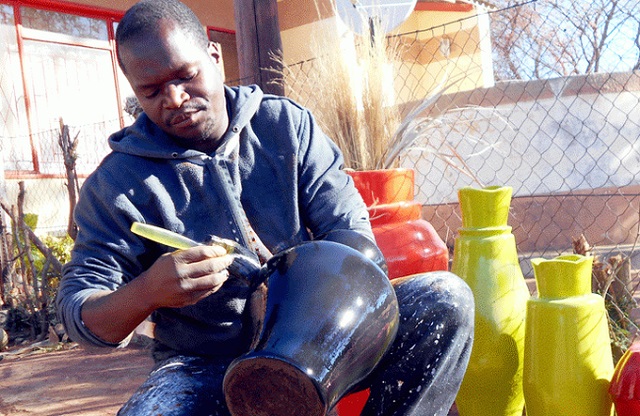
GABORONE, BOTSWANA | Xinhua | At Dukwi Refugee Camp, located about 550 km northeast of Gaborone, the capital of Botswana, some women have transformed discarded materials into exquisite items.
Evert Mabela, a 44-year-old from North Kivu, a province in the eastern Democratic Republic of the Congo (DRC), rises before dawn with her colleagues to begin their daily routine of scavenging discarded materials. The materials, including old newspapers, plastics and cardboard boxes retrieved from the garbage dumps at Dukwi Refugee Camp, were transformed into various items and sold to increase their incomes.
Among the estimated 430 Congolese refugees residing at the camp, Mabela has endured immense hardships, losing her home, relatives and livelihood due to the war in her native country. However, she remains resolute in her determination to make a positive impact on her community and environment.
“I refuse to lose hope and am determined to create a positive impact on my community and the environment,” she said. Mabela is confident that with Botswana’s commitment to refugee protection, she will succeed.
“We craft a variety of decorative items from old newspapers, discarded plastics and cardboard boxes,” Mabela explained, emphasizing that their initiative not only generates income but also contributes to keeping the environs of Dukwi Refugee Camp clean.
Their crafted artifacts, ranging from photo frames and flower pots to table decorations and pen holders, often bear a price tag between 5 and 20 U.S. dollars. Mabela acknowledges that their products may lack perfection as they are still mastering the craft but emphasizes their commitment to environmental cleanliness and income generation.
Since its inception in April 2023, the project has attracted around 30 female refugees from diverse nationalities at Dukwi Refugee Camp, all devoted to turning trash into treasure.
“Our project has gradually gained attention in the area, surprising many who couldn’t believe that discarded materials could be transformed into something beautiful,” said Namco Bool, a 30-year-old refugee from Somalia.
Bool said the women not only sell their creations in Francistown, Botswana’s second-largest city situated 80 km west of the refugee camp, but also participate in various exhibition shows and markets.
According to Bool and Mabela, the sales yield about 1,000 dollars per month for the refugee camp.
The revenue generated by these women helps fill the financial gap resulting from dwindling monetary support from the international community, said Machana Ronald Shamukuni, Botswana’s minister of justice.
Noting the significance of this project, Shamukuni said “Firstly, it breathes new life into discarded materials, particularly old newspapers and plastic items. Secondly, it provides a means of income for suffering refugees who may have limited employment options and rely solely on food rations.”
Established in 1978, Dukwi Refugee Camp is now home to at least 725 refugees, according to the latest figures from Botswana’s Ministry of Justice. Shamukuni affirmed Botswana’s commitment to ensuring refugee protection and sanctuary, vowing to employ all available resources for this cause.
 The Independent Uganda: You get the Truth we Pay the Price
The Independent Uganda: You get the Truth we Pay the Price





